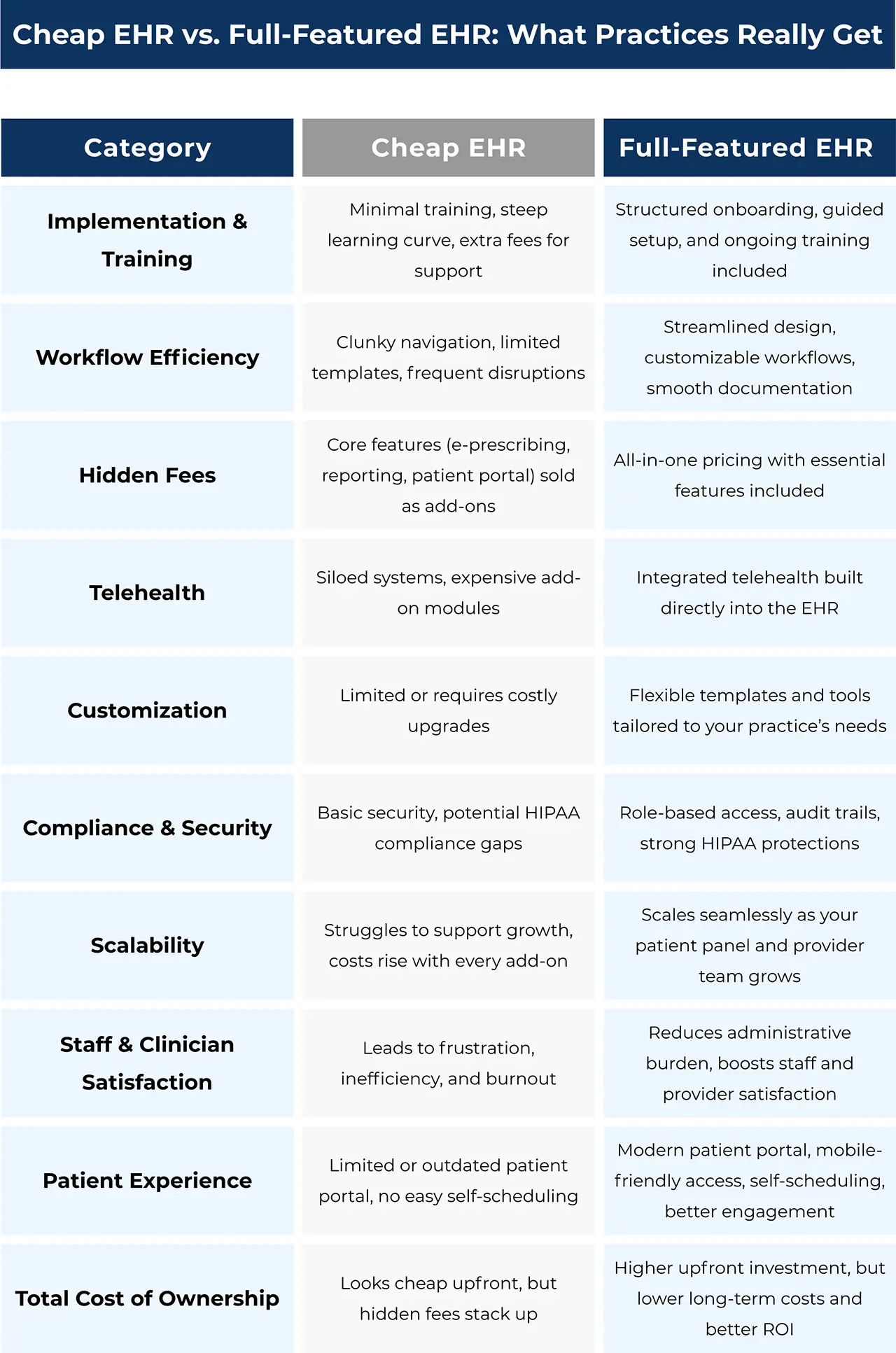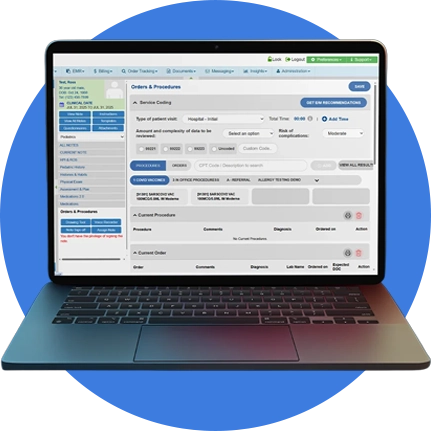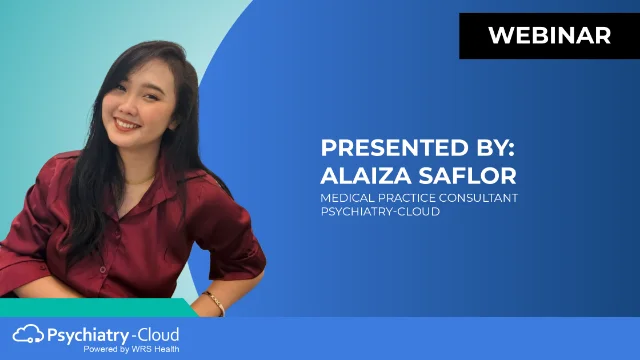Key Takeaways
- When evaluating a mental health EHR system, look beyond the sticker price.
- The real cost of a cheap EHR shows up in inefficiency, staff burnout, compliance risks, and patient dissatisfaction.
- A robust, scalable EHR might require a higher initial investment, but it pays off by streamlining workflows, improving patient care, and avoiding a cycle of add-ons and hidden fees.
- Discover 5 secrets to an easy behavioral health EHR transition.
At first glance, a cheap EHR might seem like the perfect solution for a growing behavioral health or psychiatry practice. After all, why spend more when you can start with something “affordable”? But many mental health providers soon discover that what looks budget-friendly on paper often leads to frustration, hidden fees, and workflow disruptions that harm both care delivery and clinician wellbeing.
If you’re weighing options like an affordable EHR for mental health practices or even asking, “is there a free EHR?”, it’s important to understand the full picture of what you’re actually paying for.
Table of Contents
The Real Price of Implementation
Implementation is often where the first surprise costs show up. With most inexpensive EHRs, onboarding is minimal, with little guidance beyond the basics. That means:
- Limited training that leaves therapists or psychiatrists guessing how to document progress notes, treatment plans, and DSM-5 diagnoses correctly.
- Extra hours spent troubleshooting integrations like telehealth or e-prescribing instead of focusing on clients.
- Additional charges for “premium” training sessions or extended support.
The result? Extended adoption timelines, frustrated clinicians, and administrative staff who struggle to fully embrace the system. For mental health providers already managing high caseloads, even small inefficiencies compound into bigger problems such as missed notes, billing errors, or noncompliance with documentation requirements.
Experienced behavioral health EHR vendors like Psychiatry-Cloud address these challenges with free implementation and comprehensive training tailored to therapy workflows, psychiatry, or group practices.
Workflow Disruption: The Cost You Don’t See on the Invoice
A clunky or limited EHR starts as something that slows down your day. Over time, it slowly reshapes your entire practice, often for the worse.
- Documentation bottlenecks: A general EHR may lack SOAP or DAP note templates, forcing providers into time-consuming manual work.
- Inefficient billing workflows: Without integrated support for behavioral health billing codes or prior authorizations, reimbursements are delayed.
- Staff burnout: Extra clicks, repetitive data entry, and poorly designed interfaces increase charting time—leading to after-hours “pajama time” charting and reduced clinician satisfaction.
For example, imagine a therapist trying to build a treatment plan from scratch in a generic EHR versus using one with pre-built, editable mental health templates. The difference is hours saved per week and less frustration.
The Nickel-and-Dime Trap: Add-Ons and Hidden Fees
Many practices start with a low sticker price, only to realize that essential tools for behavioral health are locked behind add-on costs. Common examples include:
- Progress note templates for therapy sessions
- Secure patient messaging or portals for client engagement
- E-prescribing for controlled substances (critical for psychiatry)
- Outcome tracking tools for depression, anxiety, or ADHD scales
What looked like an affordable EHR for mental health practices can quickly balloon into a system that costs more than premium solutions without delivering the same value. Psychiatry-Cloud’s full-featured EHR system solves these pain points by delivering reporting, e-prescribing, and customization capabilities along with patient portal access and more, right from the start.
Telehealth and Siloed Charges
For mental health, telehealth is non-negotiable in care access. Yet with a cheap EHR, telehealth may be sold as a costly add-on, or worse, not available at all.
This forces providers to juggle separate systems for scheduling, documentation, and video visits which ultimately adds in subscription costs, complicating workflows, and creating compliance risks (HIPAA especially).
A full-featured EHR integrates secure telehealth directly into scheduling and documentation, so therapists can move seamlessly from intake to video session to billing without hopping between platforms.

How Much Does a Behavioral Health EHR Cost, Really?
- Direct costs: Licensing, setup, support, and training.
- Indirect costs: Lost productivity from clunky documentation, staff turnover due to burnout, and billing errors from missing behavioral health-specific features.
- Growth costs: Paying extra for every new provider, reporting tool, or telehealth license as your practice expands.
So if you’re asking, “how much does an EHR cost?”, the answer depends not just on what you see upfront, but on the hidden fees and long-term inefficiencies of a cheap EHR.
What a Full-Feature Mental Health EHR Provides From Day One
- Free implementation support – Workflows for individual therapy, group therapy, and psychiatry are set up correctly from day one.
- Comprehensive training – With proper training, a whopping 83% of end-users report satisfaction compared to only 36% without it. In a full-featured EHR, your team gets hands-on training on notes, treatment plans, and reporting, not just a quick demo.
- Data migration included – Client records, demographics, and historical notes move over smoothly without extra costs.
- Specialty-specific customization – Templates for progress notes, outcome measures (like PHQ-9, GAD-7), and medication management tailored to behavioral health workflows.
- Ongoing support – Access to responsive customer support and continuous training at no extra charge.
Choosing Wisely: Invest in Long-Term Value
- Does this system include therapy- and psychiatry-specific tools?
- Are telehealth, patient engagement, and outcome tracking built in or sold separately?
- How much training and support are included?
- Will the system scale with my growing caseload or practice?
Investing in a robust EHR designed for mental health practices is about long-term value. The right solution supports your growth, prevents clinician burnout, and ensures patients receive consistent, high-quality care.











